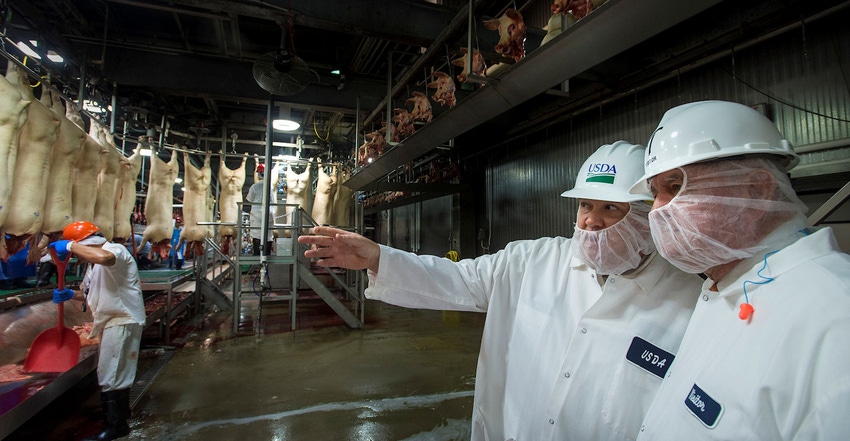Members of Congress call for withdrawal of swine slaughter modernization rule.

The U.S. Department of Agriculture’s rule to modernize swine slaughter inspection continues to draw fire, with the latest action coming from a total of 61 members of Congress, led by Reps. Rosa DeLauro (D., Conn.) and Mark Pocan (D., Wis.).
The New Swine Slaughter Inspection System (NSIS) is based on the Food Safety & Inspection Service's (FSIS) HACCP Inspection Models Project (HIMP), which will be expanded from five current pilot locations to full-scale implementation. The proposed rule would increase the number of off-line USDA inspection tasks while continuing FSIS's 100% carcass-by-carcass inspection. The off-line inspection places inspectors in areas of the production process where they can perform critical tasks that have direct impact on food safety.
DeLauro and Pocan led a letter with their colleagues urging Agriculture Secretary Sonny Perdue to withdraw the proposed rule. The new pork processing inspection rule would allow an increase in swine slaughter line speeds that the legislators said would endanger worker safety, public health and animal welfare.
The legislators noted that there is no evidence that the line speeds can be increased in a manner than ensures safe food and safe workers. “The USDA justifies the line speed increase by using a small, poorly assessed pilot project where none of the plants continuously operated at faster line speeds, and all had serious safety issues,” the letter stated.
It noted that a 2013 USDA Inspector General audit found that USDA did not properly assess the pilot project, and a report from Food & Water Watch found that the plants involved in the pilot project had more regulatory violations than comparably sized plants not involved in the pilot project.
“The Modernization of Swine Slaughter Inspection proposed rule removes all limitations on line speeds in hog slaughter plants, which will endanger the health and safety of tens of thousands of workers in the hog slaughter industry,” the members wrote. “Even at current line speeds, pork slaughter and processing workers face many job risks that can lead to severe injury, illness and death. Meatpacking workers in hog slaughter plants work in cold, wet, noisy and slippery conditions making tens of thousands of forceful repetitive motions on each shift. Meatpacking workers are injured at 2.4 times the rate of other industries, and they face illness rates at 17 times the rate of other industries.
“An increase in line speeds will result in an already dangerous industry becoming more dangerous,” the letter continued. “There is no evidence that the increased line speeds can be done in a manner that ensures safe food and safe workers. We strongly oppose swine slaughter line speed increases, the new proposed inspection system and urge you to withdraw the rule.”
The swine industry has been supportive of the rule. At the time of its release earlier this year, North American Meat Institute president and chief executive officer Barry Carpenter said the proposed NSIS has been used as a pilot project in five pork plants for 15 years and has proved to be a strong inspection model.
“Those five pilot plants have produced millions of pounds of safe pork. We look forward to working with the agency as it develops a final rule that maintains a strong level of food safety in the most efficient manner,” Carpenter said.
The legislators said if USDA does not withdraw the rule, it should extend the comment period on the proposed rule until 60 days after the final peer-reviewed risk assessment is published. The letter noted that in order to adequately access the rule’s full impact on public health, a final peer-reviewed risk assessment must be completed and available for public comment. In addition, they suggested that USDA make available any data about the risks to workers.
About the Author(s)
You May Also Like




.png?width=300&auto=webp&quality=80&disable=upscale)
